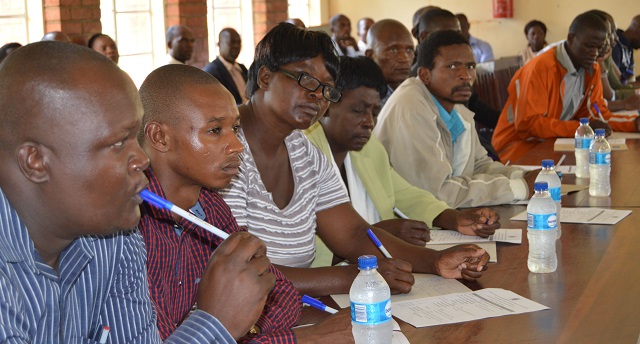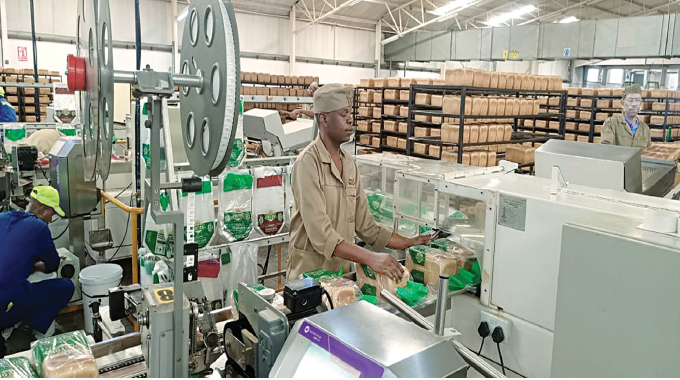Minister calls for rural industrialisation


Nkayi folks follow proceedings during the Ministry of Small and Medium Enterprises and Cooperative Development workshop on Nkayi district validation at Nkayi centre on Monday
Prosper Ndlovu, Business Editor
SMALL to Medium Enterprises and Cooperative Development Minister Sithembiso Nyoni says promoting rural industrialisation is the panacea to achieving sustainable development and balanced economic growth.
At a time when the country is experiencing economic distress with the demise of big corporates, the minister believes developing vibrant community-based value chain systems is the answer to alleviating poverty.
“The growth of micro small to medium enterprises (MSMEs) and cooperatives in rural areas is a crucial step in promoting rural industrialisation and achieving balanced economic growth,” said Minister Nyoni while addressing a needs assessment stakeholders’ validation workshop in Nkayi on Monday.
She said Government was cognisant of the fact that the economy was experiencing a number of challenges since the turn of the millennium that have adversely affected the livelihoods of the populace, especially women and youth in rural communities who mainly depend on farming and informal employment.
Among these challenges is the closure of companies, rising unemployment, climate change, global market shocks and slow economic growth. The combined effect of these has been exacerbated poverty levels, which stand at 62,6 percent nationally and 75 percent in the rural areas, according to official statistics.
“While the Government is tirelessly working to overcome these challenges and vulnerabilities, implementing sustainable livelihoods programmes buttressed by locally owned economic and resource endowments is not only vital in achieving poverty reduction and empowering disadvantaged women and youth, but also in creating a breeding ground for MSMEs and cooperative development,” said Minister Nyoni.
In line with this thrust, she said her ministry has come up with a programme to revive at least three growth points in each province through supporting comprehensive business development initiatives.
This entails providing key support services in areas such as training in production areas, entrepreneurship, value addition and beneficiation, financial literacy, quality standards, provision of start-up equipment and technical assistance in value chain mapping and market access including micro-credit support.
As such, the minister said provincial and district structures and stakeholders need adequate capacity to implement poverty alleviation interventions and entrepreneurial development strategies.
“It is thus, critical to reinforce these organisations in districts to effectively enhance their mandate in sustainable livelihood development. Organisations that require strengthening include savings and Credit Cooperatives (SACCOs), cooperatives, vocational training centres, information centres and other relevant community based infrastructure,” she added.
Meanwhile, Matabeleland provinces do not have business development officers at district level due to lack of qualified personnel in relevant professional fields, a senior official has said.
The Permanent Secretary in the Ministry of Small to Medium Enterprises (SMEs) and Cooperative Development, Mrs Evelyn Ndlovu, told a business gathering in Nkayi district on Monday that Government was concerned about lack of skilled personnel in the region to assume public duties.
She said the two provinces, Matabeleland North and South, lacked qualified personnel in commercial disciplines such as finance, economics and business studies, who could be employed as business development officers.
This means the ministry is only represented at provincial level in the region. This is despite the fact that each year higher learning institutions in the region such as the National University of Science and Technology, Lupane State University and the Bulawayo Polytechnic churn out thousands of graduates, who on average constitute a majority of students enrolled in the commercial fields.
“We don’t have an officer here in Nkayi because we can’t find a qualified person who can speak the local language. Those we find can’t come here because of the language barrier,” said Mrs Ndlovu.
“Right now we’re not represented in Matabeleland at district level because of lack of skilled staff but we have officers in other provinces. As communities let us encourage our children to take business and economics studies as well. We need people who have studied business and economics.”
The Permanent Secretary said her ministry has a mandate of empowering ordinary people across the country to start up their own businesses to achieve sustainable economic development.
She expressed concern that several remote districts like Nkayi were lagging behind in terms of development as evidenced by high poverty rates of above 90 percent, according to surveys.
Mrs Ndlovu said Government, through the SMEs portfolio, was facilitating the creation of sustainable and inclusive development.











Comments